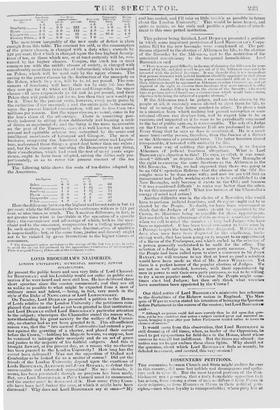This palaver being finished, Lord DURHAM presented a petition in
which some itnportant provisions of Lord Beouottem's Corpration Bill for the new boroughs were complained of. The petitioners objected to the election of Aldermen for life, to the election of the Recorder by the Aldermen, and to the restriction of the municipal constituency to the ten-pound householders. Lord BROUGHAM said
" There was one greafdifficulty in the way of chonsiog the A Mermen for years
instead of for awl that scold.' be got rid of if the Alden' Wn were not to le intrusted with the judicial fuections. It was eleuehe that, ii sr.:° inexpedient that persons intrusted with judicial functions should be appointed to their places by popular election. At the same time, it was considered difficult to say that these Aldermen should be appointed as Aldermen in other ( 'tirbo!it tu, a-tol )'et. deprived of the right to exercise those functions that were intrusted to other Aldermen. Another difficu:ty was in the choice of the Recorder, who would have to perform jolliciA functions; a eiremnstance which would form a strolls; objection to his being the subject of a poplins election."
If the Aldermen muet be judges, and are to be chosen by the people at all, it certeinly seems absind to elect them for life, be way of inuring their better conduct in office. To place a man in a situation from which nothing but proved corruption Or some criminal offence can displace him, and to expect him to be as cautious and impartial as if lie were to be periodically sununong to the bar of public opithon, is tureasonable. The :lets of a Judge on the Circuit or at 'Westminster Pall are perfhrtned in public. Every thing that he says or does is scrutinized. He is a mime more trustworthy person, therefore, than the Justice of a district or the Aldermau of a provincial town. The latter becomes almost irresponsible, if' invested with autherity for lite. The easy way of settling this pint. hoe ever, is to deprive
Aldermen of judicial fanetions altogether. Whet is Lori BROUGHAM'S objection to this? II' says, in (Tibet, it was considered " difficult to deprive Aldermen in the New Boroughs of the right to exercise the same functions as the Aldermen in the 01(1 Boroughs. Why, we bad supposed that there was going to be an Old Glporation Reform—that the abuses of the Be. roughs were to be done away with; and now we are told that an inconvenient and badly working system is to be established el the New Boroughs, only because it exists in the Old ; and because " it was considered difficult to make one better than the other. Is not this trumpery stuff? What has become of the Chtincellor's energy of mind and action? Another difficulty was in the choice of a Recorder, NVII0 wouli have to perferm judicial flinctions, and the ry•;,re ought net to be elected by time People. No doubt, we have beet( accustomed ts think that the Judges of' all ranks should be appointed by the Crown, its Ministers being re-poneible far those appoiutments. But our fiiith in the advantage or i his system ie sennew ea shalwa when we call to mind the number et very had Judge, who have' been so appointed. It has been teued ieetessary to bribe ;eine by
Peerage to quit the bench, which they disoieccd. W Willi a days also, aleo, men have been disgusted by the chaffering, huckstering work, that has been going on tl respect to an appointment
of' a Baron of the Exchequer, and which ended ia the selectee) of a person generally understood to be unfit for the office. The selection of a Judge is, in fact, a mere party measure. Now, if the People had been called upon to elect a successor to Sir JOHN BAYLEY, we will venture to say that at least as good a selectima would have been made as that of Mr. JOHN WILLI A S. Yet there is a perfect horror of the popular election of .Judges. We
are not so well satisfied, however, with their appointment by men in power to suit their own party purposes, as not to be willing. to try a more popular mode. Of course the People might sometimes elect bad Judges; but then only think what wretches' have sometimes been appointed by the Crown !
















 Previous page
Previous page